- Home
- Nancy Pickard
The Scent of Rain and Lightning Page 19
The Scent of Rain and Lightning Read online
Page 19
“I’ll leave you alone,” she said to any lurking reptiles. “And you return the favor, okay?”
Still, they were the reason she kept on her cowboy boots with their high-tops and thick leather instead of switching to shoes more suited to clambering around rocks. That was the thing about the Testament Rocks, she thought as she contemplated them—they were eighty-foot piles of contradictions, accessible yet distant, wild yet serene, safe if you were smart and lucky, but dangerous if you weren’t. They’d injured a lot of stupid or clumsy climbers, killed a couple of them, and snakebites weren’t unheard of, either. But they were also the backdrop for many of the county’s marriage proposals and not a few conceptions of its babies. There was a legend that if a girl closed her eyes at the Rocks and made a wish for love, the first boy she saw when she opened her eyes would be her husband.
Some girls should have kept their eyes closed, Jody thought.
A hawk screamed overhead as if to underscore the sentiment.
There had been boyfriends in Jody’s life, but nobody had ever proposed to her at the Rocks or anywhere else. She figured there was something about her that looked normal but that on closer inspection wasn’t—the part that made her wake up screaming, kicking against the bedcovers and hitting at the air to fight off her demons. Or rather demon, singular—the one named Billy Crosby. She tended to delay the moment when she had to tell a new man after a few dates, “Oh, did I mention my dad was murdered and there’s a man in prison for it, and my mom’s been missing ever since I was three years old?” At first, some men were sympathetic and fascinated, and they seemed to think they’d comfort and cure her. But the wise ones—in her judgment—knew there might always be places in her they couldn’t reach. They were smart enough to foresee distant and difficult times when she wasn’t with them in body, mind, or soul, and that they wouldn’t want to be with her at those times, either.
“You come with a lot of stuff,” a man had once told her.
She had long felt as if nobody but her family could understand her “stuff,” although Red probably came as close as anybody. He just held her when she had bad dreams, because he knew their source. He had them, too, as did most people who were around when Billy did his worst.
Remembering that, Jody felt even more betrayed by him.
Red knew, and he still kept contact with the man of her nightmares.
It was equally true that her “stuff” had so far kept any guy from marrying her for her family’s money. Or maybe it was just a case of how intimidating her grandfather and uncles were to any male passing through her life. Grandpa Hugh was intimidating simply by being who he was. Her uncles intimidated by forming a wall of height, muscle, and distrust around her when a date showed up.
Sometimes she didn’t mind that; sometimes she was grateful.
Jody started to shut the truck door again, but before she could stop herself she did something she didn’t want to, following an old compulsion that she had not been able to break. She dug into the tight space behind the seats until she got her gloved fingers on familiar canvas, lifted out an old green backpack and hoisted it over her shoulders.
“Idiot,” she said to herself, with only lizards as witnesses to hear it.
With the pack on her back, she hiked across the white ground to the gently slanted rear rise of the formation known as the Sphinx. She began ascending, not easy in boots, but getting traction with her gloved hands. After a bit she stopped, pausing on the golden haunches where she liked to sit and stare.
Once there, Jody checked for scorpions, brushed off the top layer of eons of dust, and plunked her butt down on the rock. As the formations eroded, “new” fossils appeared—sharks’ teeth, brachiopods, and other souvenirs of ages past. But those were not the kind that she had addictively collected for years and hid in backpacks like the worn green one she set down beside her now.
Ever since she was a child, she had searched for a different kind of remnant. She was looking for human detritus, things her mom might have left behind, and she’d been looking for them since she was old enough to know that the Kansas Bureau of Investigation had searched the most exhaustively for Laurie here. It had never made much logical sense to Jody that they’d look here for so long, but then maybe it took them a while to understand how impossible it would be to dig a grave and hide it in this hard flatness where every anomaly showed up like a fox on snow. Conversely she knew, as perhaps they didn’t for a time, how quickly things got covered up or uncovered, how an engagement ring could get dropped and sparkle in the sun on Tuesday, be buried in windblown dust by Wednesday, and then be found by a stranger thirty years later when it popped up to the surface again. A search for clues here could take centuries, not days or hours. Eventually the KBI had abandoned their search, but Jody didn’t. She had a lifetime to wait for any bit of evidence that suggested her mom had been here at the Rocks that night or at any time. Maybe one day an SOS or Help Me would appear. Maybe she’d look down and read LL Was Here. She thought of this place as a gigantic Etch-A-Sketch: with even the slightest twist of the weather dial, everything shifted in subtle ways. The KBI and the sheriff might have given it their best effort, but the entire surface of this landscape could have altered every moment while they looked, then change again the moment they quit looking, and they wouldn’t even have detected the differences. They could have missed something that wind or rain revealed at a later time.
Like an amateur archaeologist, in her secret backpacks Jody stowed bits and pieces of human lives, always hoping for the “big find” that might startle with its revelation and answer the questions that haunted her. If scientists could find a single tooth that revealed the presence here of prehistoric sharks, could she not find a telltale sign from mere years ago?
As a child, she had shown her first finds to her grandparents, to Chase and to Uncle Meryl and Aunt Belle.
“What’s this?” her grandpa asked her, holding up the artifact she’d found, a hair clasp or key, something lost to memory now. The family had driven out to the Rocks with some out-of-town relatives that morning, a sightseeing trip they always took with visitors.
“It might be something Mommy dropped,” she answered.
She recalled even now the look he passed to her grandmother over her head when she said that. She was six, old enough by then to know her mother was missing and that people had looked for her and that a lot of the looking had taken place at the Rocks. They got cemented in her mind when she was little as a place her mommy might have gone.
She was old enough to sense that she’d said something wrong.
She remembered Grandma Annabelle coming over to her.
“Is that why you picked it up, sweetheart?”
“What?”
“This?” Her grandmother held out the object for her to see.
“It might be Mommy’s.”
That was all Jody remembered of the incident. She didn’t know what was said next. She just remembered getting the feeling they didn’t like it that she’d picked up the thing because of her mother. It may have been the first hint she’d revealed that she didn’t totally believe that her mother was as dead as her father. She was only a child, though, so she didn’t give up trying to snag their interest in her discoveries. The next time she found something, she showed it to Chase.
“Not a good idea,” he said, or words to that effect.
That criticism struck her to the core. It also pissed off her six-year-old self.
“It is, too,” she insisted.
“The reason it’s not a good idea,” he instructed her, “is that hundreds of people leave stuff out there every year. All you’re going to bring back is dirt and germs and other people’s trash. You don’t want to do that.”
But oh yes, she wanted to.
With Uncle Bobby still in the Army, he never saw her fossils.
Uncle Meryl was sympathetic, but did not encourage her macabre hobby.
Aunt Belle took action, lifting her treasures out of her small h
ands and walking them to the trash bin near the barn. Belle dumped them there, over the rim above her niece’s head, and deep, where not even a child standing on a bucket could reach them.
“No,” Belle said to Jody, as if she were a puppy to train. “No!”
Yes! the child thought, and from then on kept her secret from all of them.
They started monitoring her visits to the Rocks.
She had to wait until she could go with other families, or her Girl Scout troop, and after that she had to wait until she was old enough to drive out to the Rocks on her own or with girlfriends or boys.
“What are you doing?” her friends would ask.
“Picking up the litter,” she’d claim. It earned her an undeserved reputation for being an ecological good citizen. Or, she thought more likely—just a nut. Every now and then she had to stop her well-meaning friends from “helping” her. Sometimes she resorted to offering to get rid of their collections of trash for them, just so she could go through it in her room late at night down on the carpet in the space between her bed and the wall.
Jody couldn’t stop looking, because she couldn’t be sure.
There had been a Kansas playwright, William Inge, whom she hoped to introduce to her honors classes if she ever got to teach any. He’d written Picnic, Bus Stop, Splendor in the Grass, and a play called Come Back, Little Sheba, in which a lonely wife kept going to her back door in the vain hope that her lost dog had returned. Sometimes Jody felt as if she had to keep opening doors in case her mother might be standing there.
Partway up the Sphinx, she examined the ground, not the horizon.
That was why she missed seeing dust rising on the road from an approaching vehicle.
IT WAS A beat-up old truck speeding toward the Rocks.
Soon its driver was parked and walking toward her, daylight visible through his bowed legs.
“Aren’t you even goin’ to ask me what my reason was?”
Red Bosch stood with his hands at his skinny hips, looking up to where Jody sat on the haunches of the Sphinx. She resisted her desire to pick up rocks and hurl them at him.
She could barely make herself look at him.
“You followed me.” She made it an accusation.
“You could give me the benefit of the doubt, you know.”
Jody did pick up a rock then, but only rolled it around in her hands, looking down at it instead of at Red, feeling sick at the thought of what she had done with him without knowing what he’d been doing behind her back, behind the backs of everybody in her family.
“He was too drunk, Jody.”
She looked off into the distance, not at him.
“When I picked Billy up in Bailey’s parking lot, he was almost unconscious drunk. There was no way he could sober up enough to get from his house to your house, not drivin’ and not on foot. No way. Not within the time frame when your dad got killed, that’s for sure.”
“You were sixteen!” Her tone mocked his interpretation of events.
“Well, I knew what drunk was. I wasn’t a sheltered kid, Jody.”
She flushed. Not like you, he meant.
“Jody, they didn’t give him a breath test.”
Finally, she glanced at him, but then quickly away again.
“Did you hear me? I’m tellin’ you they didn’t check his blood alcohol level. Now why do you suppose that was?”
She didn’t say anything but was thinking furiously, back to all the transcripts and records she had read over the years. She couldn’t remember ever seeing the results of a breath test, or any testimony about one. It never occurred to her to realize one was missing.
“I’ll tell you why that was,” Red persisted. “It’s because it would have screwed with their assumption that he did it. A blood alcohol test would have proved he couldn’t have functioned anywhere near well enough to do what they said he did. Hell, Jody, he was still stumbling when they picked him up the next morning. He could barely put two words together. There is no way on God’s green earth that he got off that couch, crossed three blocks in thunderin’ rain, got into your parents’ house, climbed the stairs—”
“Stop.”
“—And then drove his truck somewhere with your—”
“Stop!”
Her right foot jerked reflexively as if she were trying to brake. It dislodged pebbles. They rolled to the ground, coming to rest near Red’s boots, raising a faint clatter and tiny puffs of white dust. Red stepped forward onto one of the pebbles and ground it to powder.
“I’m sorry this makes you feel bad,” he said.
“It doesn’t make me feel bad,” she lied. “It makes me furious.”
He smiled slightly, ruefully. “I get that. But this is why I kept in contact with him. You can understand that, right? I never believed he did it. I thought Billy got a raw deal. I was young and maybe idealistic, I guess. Or maybe I’m just a dummy, but I know what I know. I’m not saying Billy wouldn’t have done it, but just that he couldn’t. Not that night anyway. And nobody listened to me about how drunk he was because, like you said, I was sixteen and what did I know? Especially since they all had their minds made up already. He did it, that was that, and nothing different was ever going to be considered.” The look he gave her was pleading. “But he didn’t do it, Jody. I’m not sayin’ I like the guy. And please understand, when I say I kept contact with him, I mean like three Christmas cards and one five-minute visit over twenty-three years—”
“You went to see him in prison?”
Warily, Red drawled, “Yeah, I did. And I wasn’t impressed and I never went back. It’s not like he changed in prison into a saint, ’cause believe me, he didn’t. I’m just sayin’ it wasn’t right what they did, even if they thought they were doin’ it for the right reasons.”
“‘They’ being my family?”
“They being everybody but me, I guess.”
“You and Collin, apparently.”
He blinked, then nodded. “Yeah.”
“What do you mean he didn’t change into a saint in prison?”
Red glanced behind him, back toward the dirt road leading into the Rocks. “Jody, you need to leave here now.”
“Leave? Why?”
He looked back up at her. “Like I said, I went to visit him that one time. He told me if he ever got out of jail the second thing he wanted was a pork tenderloin from Bailey’s. The next thing he wanted was to get laid. But the first thing Billy wants is to see this place.”
“Why?”
“Because it means, like …” Red struggled to find what he wanted to express, and finally said, “… home.”
Jody didn’t want to understand that, but she did. Because there was nothing like them anywhere else, the Rocks meant home to most people who lived near them. When people from Rose got a glimpse of them after being away, they knew they were back. She didn’t want to share that feeling with a murderer—an alcoholic, wife-beating, animal-abusing, lying, ex-convict murderer.
She dropped her face into her hands.
What if he wasn’t all of those things?
“Jody?” Red stepped forward, concern on his face.
When she looked up, she was leaking tears again. “Oh, Red. Everybody I know—except you, I guess—believes he killed my parents.”
“Yes, they do. I know.”
“But you’re telling me they’re wrong. I’m wrong. We’re all wrong.”
“That’s what I’m sayin’. I suppose you don’t have to believe me.”
She stared at him, knowing he was a man who’d always rather tell the truth than not. Of the two of them, she was the one who felt most comfortable with the lies they told so they could keep playing together. If he’d had his way, and even though he’d scampered like a scared weasel out of her bedroom that very day, Red might have taken his chance with the truth. She knew that was because he thought that much of her and of her family.
“Why’d you run out of my bedroom today, Red?”
“Why’d I
what?” He laughed a little at her unexpected question.
“Did you run off just because of your job?”
“I left ’cause if they’re goin’ to find out about us, it’s not goin’ to be like that.”
Out of consideration for her. That’s what he meant.
Maybe she wasn’t the more mature of the two of them after all, she thought.
She dropped her face into her hands again. “Oh, dammit, Red.”
“What’s the matter, babe?”
This time the wry laughter was hers. “What’s wrong? Red, I don’t want to have to be fair. I don’t want to start believing what nobody else that I love believes.” She didn’t see the flinch that passed across his face at those words. “I don’t want you to be right.”
She sighed, every fiber in her resisting his story.
“Listen to me, Jody. One thing you have to believe right now is that you’ve got to get out of here.”
“Why? What’s he going to do to me if he shows up and I’m here?”
“That’s the thing, babe. I don’t know. I just know he was angry when he went into prison and he was angry that time I saw him and he’s had more years since then to build up an even hotter head of steam.”
Old anger burst out of her again. “As if he has any right to it!”
“Jody. That’s what I’m saying. He has a right to it.”
She felt emotionally exhausted, scared of what he’d told her, and confused by it.
“I’ve hated that man for twenty-three years, Red.”
“Babe, it doesn’t matter if you hate him. It only matters if he hates you.”
That sent a shiver down her spine.
“He’s for sure coming back today?”
“They let him go this morning.”
There was increasing urgency in Red’s tone.
“I suppose his son is driving him back.”
“So I hear.”
Red looked back toward the road. Nervously, he shuffled his boots in the white dust. It was about a five-hour drive from Lansing, where the prison was.

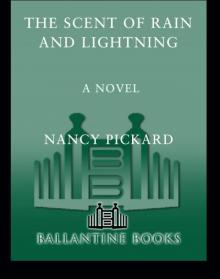 The Scent of Rain and Lightning
The Scent of Rain and Lightning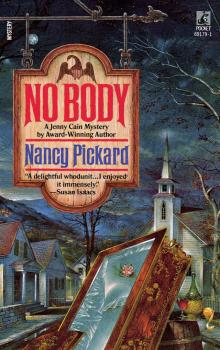 No Body
No Body The Secret Ingredient Murders: A Eugenia Potter Mystery
The Secret Ingredient Murders: A Eugenia Potter Mystery The 27-Ingredient Chili Con Carne Murders: A Eugenia Potter Mystery
The 27-Ingredient Chili Con Carne Murders: A Eugenia Potter Mystery Twilight
Twilight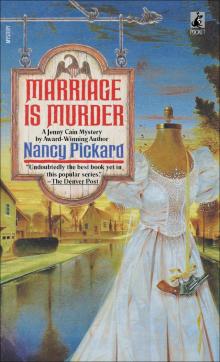 Marriage Is Murder
Marriage Is Murder I.O.U
I.O.U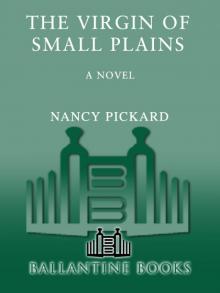 The Virgin of Small Plains
The Virgin of Small Plains Generous Death
Generous Death The Whole Truth
The Whole Truth The Blue Corn Murders
The Blue Corn Murders Say No to Murder
Say No to Murder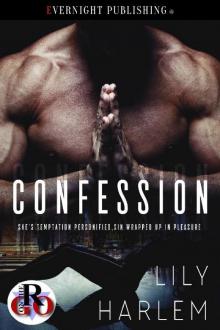 Confession
Confession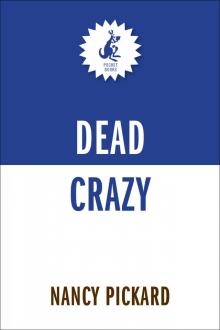 Dead Crazy
Dead Crazy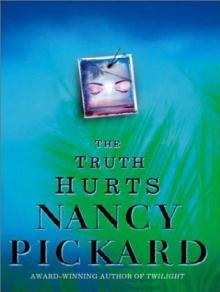 The Truth Hurts
The Truth Hurts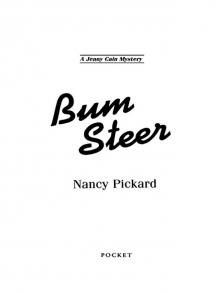 Bum Steer
Bum Steer